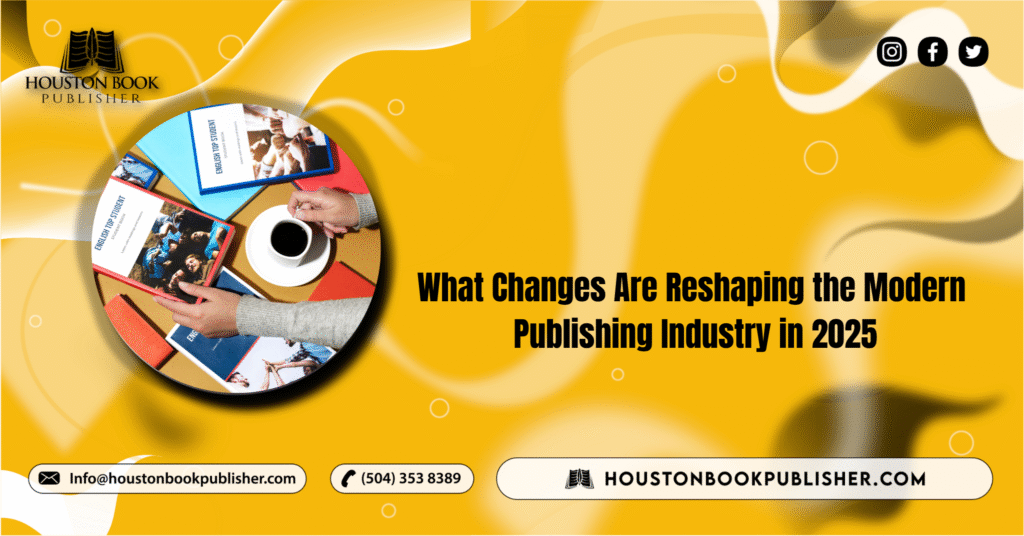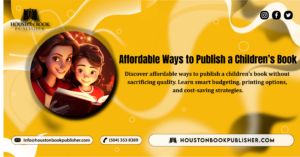
The publishing industry, once rooted in tradition and predictability, has been transformed by technology, digital disruption, shifting author expectations, and evolving reader behavior. The days when a handful of major publishing houses controlled book distribution are long gone. Instead, today’s publishing ecosystem is faster, more inclusive, technology-powered, and opportunity-rich. But with opportunity comes complexity.
So, what exactly is reshaping the modern publishing industry and how are authors adapting? Let’s explore the major transformations redefining how books are created, published, distributed, and discovered.
The Shift from Traditional to Author-Centric Publishing
For decades, authors had one dream: land a contract with a major publisher. But today’s landscape offers far more flexibility. Traditional publishing is still influential, but authors now have alternative paths:
| Publishing Method | What It Offers |
|---|---|
| Traditional Publishing | Prestige, professional editing, wide distribution |
| Self-Publishing | Full control, faster publishing timeline, higher royalties |
| Hybrid Publishing | Partnership model with shared responsibilities |
| Small/Regional Publishers | Personalized support and niche markets |
Why the shift? Authors increasingly want control over rights, royalties, and timelines. Many are no longer willing to wait 12–18 months for book releases or give up lifetime rights. As a result, self-publishing platforms like Amazon KDP, IngramSpark, and Draft2Digital are dominating the global publishing landscape.
Even book publishers in Houston and other regional hubs are redefining their services to support authors with hybrid publishing and personalized editing, marketing, and book design bridging the gap between traditional and independent publishing.
The Rise of Digital Publishing and Ebooks
Digital publishing has completely transformed reader habits. While print books remain popular, ebooks and audiobooks have carved out a fast-growing segment.
Key Reasons for Digital Growth:
- Lower publishing cost
- Instant global availability
- Reader convenience across devices
- Eco-friendly and portable
- Access to analytics and sales data
Ebooks are not replacing printed books but they are expanding the overall reading economy. Indie authors are seeing massive success by tapping into ebook markets through Amazon Kindle, Nook, and Kobo. Many book publishers in Houston now advise authors to release both print and ebook editions to appeal to diverse reader groups.
Audiobooks Are Exploding in Popularity
Audiobooks are now the fastest-growing medium in publishing. Thanks to busy lifestyles and multitasking, readers now prefer listening to stories while driving, working out, or relaxing.
Platforms like Audible, Audiobooks.com, and Spotify Audiobooks have driven demand—and audiobooks are becoming an essential revenue stream.
Author Impacts:
- Higher production cost but long-term returns
- Opportunity to reach non-traditional readers
- Growing popularity in nonfiction, self-help, and fiction
Professional publishers now integrate audiobook production into publishing plans to maximize reach.
AI and Technology Are Transforming Publishing
Artificial Intelligence has entered book publishing—quietly but powerfully. From editing tools to marketing analytics, AI is accelerating production and raising new questions about creativity.
Current AI Impacts:
- AI Editing Tools like Grammarly and ProWritingAid speed up revisions
- AI Cover Design tools help create early design concepts
- AI Narration is being used for low-cost audiobooks
- AI Content Assistance supports research, formatting, and rewriting
However, full AI book creation raises ethical issues like originality and copyright. Most trusted book publishers in Houston and other professional publishers emphasize AI as a support tool—not a replacement for real writers.
Social Media Is the New Book Marketing Engine
Gone are the days when publishers handled all marketing. Authors must now actively build a personal brand. Platforms like TikTok (#BookTok), Instagram (Bookstagram), and YouTube (BookTube) are reshaping book promotion.
Why It Works:
- Direct engagement with readers
- Viral book trends lead to sudden sales spikes
- Influencers boost book discovery
Even debut authors now sell thousands of copies organically thanks to reader communities. Publishers now screen authors based on their online presence digital influence matters more than ever.
Reader Demand for Inclusion and Diverse Voices
The modern publishing world is prioritizing diversity stories that reflect global cultures, languages, and perspectives. Books from underrepresented voices are gaining momentum.
Diversity Trends:
- Demand for inclusive representation
- Growth in cultural memoirs and personal stories
- Rise of independent publishers amplifying new voices
Many independent and regional publishers, including book publishers in Houston, actively support diverse authors by offering customized publishing plans and creative freedom.
Data-Driven Publishing and Analytics
Technology now helps publishers make smarter decisions. From keyword trends to genre analysis, data guides publishing strategies.
Key Analytics Tools:
- Amazon KDP keyword research
- Google Trends for reader interests
- Book sales performance dashboards
- AI-powered audience targeting
Today’s successful authors don’t just write—they study markets.
Print-on-Demand and Eco-Friendly Publishing
Print-on-Demand (POD) has solved a huge industry problem: printing costs and inventory waste. Authors no longer need thousands of upfront copies—books are printed only when ordered.
POD Benefits:
- Minimal risk
- Lower cost
- Global delivery
- Zero storage needs
Publishers now offer POD as a standard option to reduce environmental impact.
Case Study: The Rise of Houston-Based Book Publishing Services
To truly understand the modern shift, let’s explore a case study from the U.S. publishing market.
Rising Success Through Personalized Publishing
Background:
An aspiring author from Texas, Samantha Lee, wrote a memoir about overcoming personal trauma. She approached several major publishers but received rejections. Determined to bring her story to the world, she explored alternative options.
Challenge:
She didn’t want full self-publishing because she needed professional support—but traditional publishing was too slow and restrictive.
Solution:
She partnered with one of the book publishers in Houston offering hybrid publishing services. They helped her with:
- Professional editing and proofreading
- Book cover design and formatting
- Ebook + print-on-demand setup
- Amazon and IngramSpark distribution
- Social media marketing strategy
Outcome:
- Published within 90 days
- Sold 4,200 copies in 6 months
- Book featured locally by Houston media
- Built an email list of 3,500 readers
- Invited for speaking engagements
Key Lesson:
Regional publishers can offer flexible, author-friendly services that combine professional publishing quality with creative freedom. This approach is helping countless writers publish faster and smarter.
The Death of the Gatekeeper Era
In the past, a handful of New York publishing executives decided what stories deserved to be told. Today, the power has shifted—to authors and readers. Thanks to Amazon, global publishing platforms, and digital marketing, authors can reach millions without a traditional publisher.
The publishing world is no longer limited to “Big Five” publishers. Independent publishers, hybrid publishers, and book publishers in Houston and other cities now give authors more control, more royalties, and more opportunity.
Future of Publishing – What’s Next?
The transformation isn’t over. Here’s what the next five years may bring:
| Trend | Industry Impact |
|---|---|
| AI-assisted content and design | Faster publishing, new ethical debates |
| Subscription reading platforms | Bigger ebook demand |
| Personalized print runs | Custom editions for readers |
| Global publishing collaborations | International author success |
| Blockchain publishing | Secure royalties and copyright protection |
Conclusion
The modern publishing industry is no longer a closed system controlled by a few it is an open, evolving world full of opportunity. Authors now have control over how they share their stories whether through self-publishing, hybrid models, or independent publishers.
Regional publishers like book publishers in Houston are playing an exciting role in this transformation by giving authors real choices, personal guidance, and faster publishing alternatives.




3 Responses